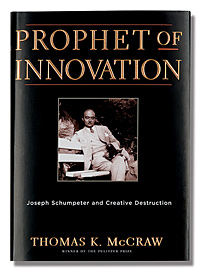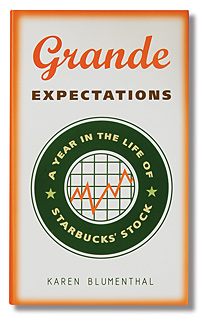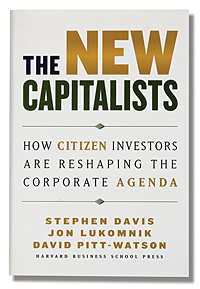Best Business Books: Capitalism
Schumpeter’s Legacy

William J. Baumol, Robert E. Litan, and Carl J. Schramm
Good Capitalism, Bad Capitalism, and the Economics of Growth and Prosperity
(Yale University Press, 2007)
Karen Blumenthal
Grande Expectations: A Year in the Life of Starbucks’ Stock
(Crown Business, 2007)
Stephen Davis, Jon Lukomnik, and David Pitt-Watson
The New Capitalists: How Citizen Investors Are Reshaping the Corporate Agenda
(Harvard Business School Press, 2007)
Bruce Franklin
The Most Important Fish in the Sea
(Island Press/ Shearwater Books, 2007)
Thomas K. McCraw
Prophet of Innovation: Joseph Schumpeter and Creative Destruction
(Belknap Press of Harvard University Press, 2007)
The living standard of Americans is 10 times greater today than it was a century ago. In China, which is making its spectacular economic transition from centrally planned to capitalist markets, average living standards are doubling about every seven years. Formerly debt-burdened economies in Latin America are growing. Although dozens of countries still have per capita income levels far below those the United States had achieved by 1870, economic growth in many more countries is now substantial, delivering an impressive quantity and quality of goods and services — as well as better health, better education, and longer lives. Global growth has also become more stable. Since the mid-1990s, the volatility of all the rich economies has diminished significantly. For the past two decades, capitalism has improved the lives of more and more people around the world. With such achievements, why would anybody want an alternative system to run our economies and societies?
Yet there are vocal challenges to capitalism. Some come from ardent environmentalists who believe economic growth inevitably harms the environment, perhaps catastrophically so. Others arise from the nationalist politicians of Latin America who are opposed to the influence of global firms in their countries. In Europe, a coalition of labor unions and anticorporate campaigners demands corporate social responsibility and opposes the takeover of businesses by private equity groups and the growing role of hedge funds in financial markets. Polling evidence from many countries, such as the Pew Global Attitudes Project or Eurobarometer survey results, suggests a generalized sense of insecurity, which people blame on globalization — capitalism without borders.
Critiques of capitalism tend to reflect three factors: wariness of capitalism’s alleged degradation of the quality of life, sacrifice of the public good for private gain, and the turmoil of unchecked growth. These themes run through analyses of the spectacular growth of the 20th century, including the writing of the Hungarian political economist Karl Polanyi (in The Great Transformation, 1944), the works of economist John Kenneth Galbraith, and more recently those of sociologist Richard Sennett, who believes that capitalism has so changed our value system that “stability as such increasingly lacks moral prestige,” as he puts it in The Culture of the New Capitalism (Yale University Press, 2006). Several new books focus on the perennial tensions between good and bad capitalism through the perspective of 21st-century concerns. Each author — a Harvard Business School management history professor, a Wall Street Journal reporter, three leading university- and foundation-based economists, a professor of English and American studies, the former deputy comptroller of New York City, a leader of a socially responsible investment fund, and a corporate governance expert — brings his or her own experiences to the subject.
 Prophet of Innovation
Prophet of Innovation
The thinker who, more than anybody else, captured the tension between the two aspects of capitalism — rising prosperity and the inherent instability it brings — was Joseph Schumpeter. The economist behind the notion of “creative destruction” is often viewed as a mindless disciple of the capitalist system. Certainly he insisted on the importance of entrepreneurs, “the pivot on which everything turns,” as he described them. However, as the marvelous new biography Prophet of Innovation: Joseph Schumpeter and Creative Destruction, by Thomas K. McCraw, shows, Schumpeter well appreciated capitalism’s negative aspects. McCraw, a professor emeritus of business history at Harvard Business School, explains how Schumpeter’s insights about capitalism, universal as they are, stemmed from his own experiences of an extraordinarily turbulent period in world history, spanning two world wars. The book is an exemplary work of biography, rooting the ideas of its subject firmly in the context of his life. Schumpeter understood that capitalism could become materialism, that human relationships could suffer from the calculation of personal costs and benefits, and that businesses could and would seek a profit on anything, no matter how distasteful.
But Schumpeter always wrote about capitalism as more than an economic system. He appreciated that it was a human order with social, political, and cultural implications. A study of Schumpeter’s ideas is particularly timely now, as he is one of the few economists to have studied the impact of new technologies and the dynamics of how companies are born and die. With one dot-com boom and bust in recent times and another such cycle under way, and with globalization also bringing corporate upheaval, few other thinkers from the past seem as relevant. Schumpeter’s great work, Capitalism, Socialism and Democracy (1942), is no one-sided hymn to capitalism, although its purpose is clearly to praise capitalism and condemn socialism. Schumpeter was highly skeptical about the ability of those who live off the state to practice “democratic self-restraint” and for them to abstain from interfering in the lives of others; his predictions about the retreat of democracy in the socialist states were amply confirmed by events in the second half of the 20th century. The key factor in his analysis of the political form of capitalism is that it limits the scope for interference with individual choice: “Modern democracy rose along with capitalism, and in causal connection with it,” Schumpeter wrote, a hypothesis that will surely be tested by China’s experiment with a capitalist economy and a Communist polity.
The Four Capitalisms
In their book, Good Capitalism, Bad Capitalism, and the Economics of Growth and Prosperity, New York University Harold Price Professor of Entrepreneurship and Economics William J. Baumol, and Robert E. Litan and Carl J. Schramm of the Kauffman Foundation divide capitalism into four main types and highlight the differences among them. The four types are the state-guided (industrial subsidies and attempts to pick winners are common features); the oligarchic (a small group of families run much of the economy); the big firm (very large business groups account for most of the economy); and the entrepreneurial (small and startup firms play a significant role). The authors note that all economies have some elements of each of these stylized types, but one form often predominates. In the present-day United States entrepreneurial capitalism is dominant, whereas in some major European economies, state guidance outweighs entrepreneurship, big firms remain central in Japan and Korea, and oligarchy is frequently found in emerging Asian economies.
The authors deftly capture the trade-offs among different types of capitalism. In their view, entrepreneurial capitalism is clearly superior to the other varieties because it is essential to growth. However, they also note how demanding and disruptive the dynamism of entrepreneurial capitalism is compared with Europe’s state-guided model. (Baumol has made this former type of capitalism his expertise: The Economist recently dubbed him “the leading thinker about the economics of innovation since Schumpeter.”) Of the 25 largest firms in the U.S. in 1998, eight had not existed in 1960, whereas every one of Europe’s top 25 in 1998 had roots that stretched back at least 38 years. The kind of churning of livelihoods exemplified by the U.S. makes properly constructed safety nets essential, although Americans clearly find it a struggle to create them.
Further, those safety nets come at a price. The trio of economists take a dim view of the “avoidance of work” ethic that they diagnose in the culture. It is not clear to me that this is a question of culture so much as politics. After all, the French have just overwhelmingly voted in a president who has pledged to make them work harder. Whatever the explanation, though, the differences among the various forms of capitalism translate into differences in growth rates. “Countries where activities that promote growth are rewarded will grow faster than countries where this is not the case,” the authors write. And they are firm in their view that the contribution of entrepreneurs to growth is fundamental. To this end, the book offers four key pieces of advice to policymakers: make it easy to start a business; enforce property and contract rights effectively and fairly; focus government policies on growth rather than redistribution, to minimize unproductive lobbying; and ensure an open economy with strong antitrust policies to keep up the pressure from competition.
This seems such obviously good counsel that it verges on motherhood-and-apple-pie advice. Yet Baumol, Litan, and Schramm feel the need to start their book with a chapter explaining why growth driven by capitalism is desirable, and in particular disagreeing with the view that, for the sake of the environment, economic growth cannot and should not continue in the future as it has for the past 200 years. Growth is essential to improve living standards, especially in poor countries, and to pay pensions, they say; technological innovations will provide the answer to environmental concerns, at least as long as the economy is organized so that entrepreneurs have the right incentives to innovate.
Plight of the Menhaden
In his book The Most Important Fish in the Sea, Bruce Franklin, John Cotton Dana Professor of English and American Studies at Rutgers University–Newark, illustrates compellingly why we should limit growth by telling a story that dramatizes the environmentally destructive effects of industries that are built on the consumption of natural resources.
His focus is the shrinking schools of fish called menhaden. These unattractive and inedible fish turn out to be unimaginably vital to the Atlantic Ocean’s ecology; they feed on plankton, thus controlling algae growth, and themselves are a favorite feast for tuna, cod, and swordfish. Industry also relies on menhaden; they’re ground up into animal feed and fertilizer and are an important source of oil for use in a vast array of products, from floor coverings to lipstick. To those ends, they are swept up in vast nets and processed in factories.
Economics has a term for anything that can, like the menhaden, be freely harvested to the detriment of the public good: the tragedy of the commons. According to Franklin, with this species of fish, we are on the verge of a catastrophe of the commons. He documents the staggering decline in menhaden numbers, and in commercial catches of them, since industrial-scale fishing began on the eastern seaboard of the United States in the 1850s. This fishing has been, since 1997, a monopoly activity of the Omega Protein Corporation, the U.S.’s largest producer of omega-3 fish oil and the last remnant of a once-competitive menhaden industry on the East Coast. (Via a sequence of mergers and a new name, Omega is the descendant of the Zapata Petroleum Corporation founded by George H.W. Bush in 1953.)
Enjoyable as it is to have a good villain in a story, however, it’s unlikely to be the monopoly that’s to blame for the plight of the menhaden. Indeed, a competitive industry might have overfished even faster. In the face of externalities of any kind, markets do not produce the most desirable outcomes. This is true in the case of the public good, which is why we have such a lively debate about the proper role of government in capitalist societies. It is also true of environmental externalities. The limitations of markets are clear, and although almost all economists are in favor of capitalism and growth, they certainly believe markets need to be regulated. Economists understand that completely free markets are an intellectual abstraction (like perfect competition); it is anticapitalists who think of free markets as the dangerous reality.
 A Year in the Life of a Stock
A Year in the Life of a Stock
One of Joseph Schumpeter’s tremendous strengths as an economist and advocate for capitalism was his passion for case studies. Many of his books before Capitalism, Socialism and Democracy contained detailed descriptions of particular companies and businesses. In Grande Expectations: A Year in the Life of Starbucks’ Stock, Wall Street Journal reporter Karen Blumenthal gives an extremely readable and informative account of how the modern stock market operates, as seen through the prism of one stock, the Starbucks Corporation (stock symbol: SBUX). Every reader will find something surprising in Blumenthal’s look at the links in the chain of transactions and relationships that connect coffee growers in poor countries to individual investors in rich economies. These chains are long and complicated for any company, and that is what makes understanding the motives and actions of public corporations, and the relationship between operating performance and shareholder value, so challenging and fascinating.
Starbucks is a great case study. We’ve almost all consumed its products, and it has reshaped Main Streets across the globe. It is now so totemic a success story that it crystallizes the opposing views about capitalism. Anticapitalism protestors have added Starbucks to their hit list, along with McDonald’s, when it comes to heaving bricks through windows in street protests. European and American campaigners for nonviolence have pressured Starbucks into offering a Fair Trade–labeled product. The irony, as Blumenthal shows us, is that moral integrity has always been part of the company’s stated values, key to ensuring employee morale, customer satisfaction, and investor enthusiasm. It has a reputation for treating employees well. It has long-term agreements to buy coffee direct from small growers rather than sourcing through the volatile global commodity market, and it has won recognition for offering premium prices to suppliers who meet its environmental and social standards. Its small investors are astonishingly enthusiastic and loyal, turning the annual meeting into an uncritical celebratory event.
Still, it is difficult to stay on the moral high ground all the time, especially for a global powerhouse like Starbucks. As Blumenthal so ably demonstrates, it is the very success of the company that has brought it trouble — not just from corporate critics but also from the investors who have profited so handsomely from their stakes in SBUX. The company’s visibility has attracted the protestors, while the success of its business model has led to much stiffer competition and its share price no longer charges higher and higher as it mostly did up to late 2005. Blumenthal delves into illuminating detail in the case of Starbucks to illustrate the tensions inherent in the dynamics of capitalism, Schumpeter’s subject on a grand scale. A very successful business, Starbucks has created tremendous value for its shareholders. It has also been, Blumenthal argues, a good company in the widest sense.
 The Citizen Shareholder
The Citizen Shareholder
Faith in the idea that a company can serve its shareholders by serving the greater good lies at the heart of the case for “new capitalism” made by Stephen Davis, a corporate governance advisor; Jon Lukomnik, former deputy comptroller of New York City; and David Pitt-Watson, previously chief executive of activist investors Hermes Focus Asset Management. As they note in their book The New Capitalists: How Citizen Investors Are Reshaping the Corporate Agenda, patterns of shareholding have changed substantially during recent decades.
In 1970, financial institutions representing individual shareholders and retirees held just 19 percent of the typical U.S. company’s stock; the rest was primarily in the hands of very wealthy private individuals. Now, funds own more than half the U.S. stock market; in the U.K., institutional investors account for more than 70 percent. The changing nature of ownership, say the authors, has led to the rise of active shareholders who are more demanding of management. Individuals, through the vehicle of these funds, are more likely to attempt to wield corporate influence on topics ranging from a company’s employment record to its impact on the environment. As the book’s subtitle puts the argument, citizen investors are already altering the way businesses operate, and ultimately the character of modern capitalism.
There is a lot of wishful thinking in the argument that citizens are reshaping capitalism. For one thing, not many investors are activists. And a backlash against shareholder activism has emerged: Anthony Bolton, the U.K.-based superstar fund manager for Fidelity, recently used the occasion of his retirement to blast shareholder activists who use a tiny holding to try to alter corporate policies according to their own agenda. He urged companies to stand up to those seeking to divert them from maximizing profits and shareholder value. The increase in private equity financing can also be seen as part of the backlash, as private equity owners are not vulnerable to shareholder activism, although they might yet prove vulnerable to political lobbying.
At the same time, I doubt the rules for a well-run, ethical business offered in this book will be enough to satisfy today’s most ardent anticapitalists. The activists are not challenging the quality of the capitalism on offer but rather what they perceive to be its inherent flaws. But the rules in this book will give executives welcome food for thought on how to respond to the rising tide of corporate criticism.
An Enduring System
The creativity that fosters growth and raises living standards can be at the same time the destroyer of jobs or traditional economic relationships, those that are overturned when better opportunities arise. The loss of the security of the village economy, for example, is what many early critics of capitalism most regretted. Joseph Schumpeter thought that that very dynamic rendered capitalism fragile, and he feared it would give way to socialism. The experience of the half century or so after he published Capitalism, Socialism and Democracy suggests that capitalism is more resilient than the socialist alternative.
Perhaps that is why today’s anticapitalists sound so nihilistic. Pure socialism, once the only other game in town, has failed. And although there could one day be a viable blend of the best of the different varieties of capitalism — combining entrepreneurial vigor and adequate protections against the disruptive social and environmental effects of a dynamic economy — such a blend has not emerged yet.
Nihilism has always been a powerful force in politics. Anybody who doubts this should read McCraw’s biography of Schumpeter, whose thinking was forged by his own participation in the tumultuous politics of the early 20th century. Indeed, his acute economic insights were not enough to enable him, as Austria’s minister of finance in 1919, to prevent the economic cataclysm of hyperinflation and depression following World War I. Good sense was trumped by bad politics.
Capitalism as we know it was forged by early 20th-century geopolitics. Today’s political tensions will shape the kind of capitalism and the standard of life inherited by our children and grandchildren. Anybody with strong views on capitalism — as either a defender or a debunker — ought to make sure he or she understands it properly. Executives, who clearly are among the defenders, will find that all of this year’s books on capitalism will heighten their knowledge of its complex facets and their ability to debate its good and bad characteristics. But if you have time to read just one book in this category, McCraw’s Prophet of Innovation, a brilliant study of a brilliant economist who experienced for himself the acute political and cultural tensions of capitalism, should be your choice. ![]()
Author profile:
Diane Coyle (diane@enlightenmenteconomics.com) runs the London-based consulting firm Enlightenment Economics and is a visiting professor at the University of Manchester. She is the author of five books, including The Soulful Science: What Economists Really Do and Why It Matters (Princeton University Press, 2007) and Sex, Drugs & Economics: An Unconventional Introduction to Economics (Texere, 2004; new edition forthcoming in 2008).

